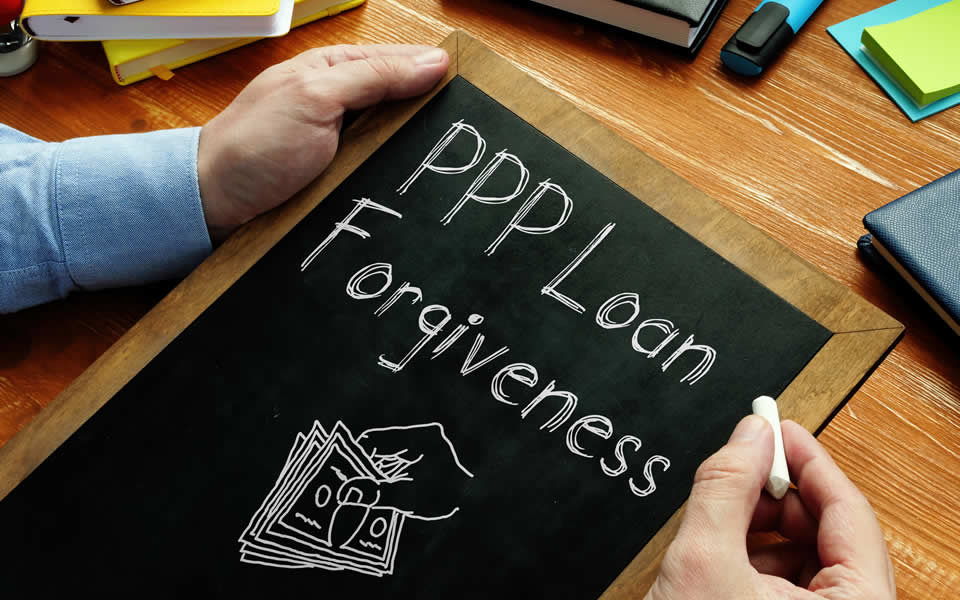PPP Update on Recent Interim Rules Addressing Forgiveness
By Eduard Zolotarev, Supervisor, Tax & Business Services
On August 24, 2020, the Small Business Administration (SBA) issued additional guidance (IFR) relating to the Paycheck Protection Program (PPP) expenses eligible for forgiveness. The SBA administers the PPP loans.
Generally, PPP loans are forgivable if a business uses at least 60% of the loan proceeds for eligible payroll costs over a covered period of 8 weeks or 24 weeks, based on the borrower’s election. Non-payroll costs are also eligible for forgiveness provided they meet certain eligibility requirements.
This new interim rule specifically addresses the cap on forgivable payroll costs for owners and employee-owners, and non-payroll costs such as related party rent, home office expenses and certain sub-lease and mortgage arrangements.
The purpose of the latest interim final rule is to provide additional guidance concerning the ownership percentage that triggers the owner compensation rule for forgiveness, and the limitations on the eligibility of certain non-payroll costs for forgiveness.
Prior to the change in the recently released guidance, the owner compensation rule stated that anyone having any ownership percentage in a company was eligible for forgiveness as follows:
- For a 24-week covered period: the lesser of $20,833 or 20.833% of 2019 compensation.
- For an 8-week covered period: the lesser of $15,385 or 15.385% of 2019 compensation.
Below is a summary of the interim guidance.
Owners/Employee Owners – Definition Changes
For purposes of an employee’s maximum salary eligible for forgiveness, an owner-employee of a C Corporation or S Corporation is someone with 5% or more ownership. Owners with less than 5% ownership are not subject to the owner-level maximum compensation limits.
Businesses with non-owner employees, or owners having less than a 5% stake, are eligible for salary forgiveness of up to $15,385 maximum per employee for the 8 -week covered period or $46,154 maximum per employee for the 24-week covered period.
This new rule allows businesses with owners having small percentages of ownership the opportunity for greater salary forgiveness.
The cap for general partners is limited to 2.5/12 of their 2019 net earnings (or 20.83%) from self-employment that is subject to self-employment tax.
Related Party Rent
If the owner of the real estate and the owner of the operating entity are the same, the related party rent is limited to the mortgage interest paid by the real estate entity during the covered period. The interim final rule states: “Any ownership in common between the business and the property owner is a related party for these purposes.”
- If the operating entity expenses the mortgage interest that the real estate entity paid, the real estate entity is not permitted to use the mortgage interest as an eligible cost if it also has a PPP loan.
- Mortgage interest payments paid to a related party are not eligible for forgiveness.
Per the ruling, PPP loans are intended to assist businesses cover non-payroll costs owed to third parties, not payments to a business’s owner that occur because of how the business is structured.
Marcum SBA Task Force Commentary
There does not appear to be a de minimis exclusion, as even a 1% common interest between the operating entity and the real estate entity is considered as a related party interest.
The SBA related party rules may come into play here. For example:
- Where one spouse / related party owns the real estate and another spouse / related party owns the operating entity, the rent is limited to the mortgage interest.
- Where ownership of the real estate and operating company is among children, parents, siblings, or spouses, but there is no direct common ownership, the eligible related party rent may be impacted.
- In a situation where there is no mortgage on the related party real estate, Marcum does not anticipate that any of the related party rent will be a qualified expense.
Home-Based Businesses
For home-based or home office deductions, non-payroll costs are limited to the covered expenses deducted on the borrower’s 2019 tax return (or that are expected to be deducted, if the business is new).
Marcum SBA Task Force Commentary
- Mortgage interest
- Rent (for residence where home office is located)
- Real estate taxes
- Utilities
- Repairs
- Cleaning and maintenance
- Internet and telephone
- If the entity applicant owns the building, the mortgage interest is similarly limited. Using the numbers in the example above, 70% of the mortgage interest would be allowed and 30% would not be considered as an eligible cost.
- If an applicant is sharing space with another tenant, the costs considered eligible for forgiveness are allocated in the same ratio as the rent / mortgage interest / utilities deducted on the 2019 tax return. If no 2019 tax return was filed because the business started in 2020, the rent or mortgage is allocated in the manner it is expected to be split on the business’s 2020 income tax return.
Typical Home office expense deductions may include:
However, under the PPP program only mortgage interest, rent, and certain utilities are allowed to be forgiven. Only those select deductions should be used to determine the qualified non-payroll costs.
Sub-leases and other rent / mortgage interest adjustments
The interim guidance clarifies the amounts of forgivable non-payroll costs in a sub-lease situation. Only the net rent paid can be included as an eligible cost. For example, if a borrower rents a building for $10,000 per month, but subleases some space for $3,000 per month, the net rent allowed for forgiveness consideration is $7,000 per month.
Click here to read the text of the guidance.
The SBA may provide further guidance through notices posted on SBA’s website at www.sba.gov. Your Marcum tax advisors and members of the Marcum SBA Task Force will also provide guidance and are available to answer questions on forgiveness or any other PPP or tax matter.
Coronavirus Resource Center
Have more questions about the impact of the coronavirus on your business? Visit Marcum’s Coronavirus Resource Center for up-to-date information.






